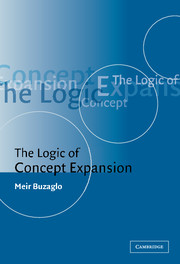Book contents
- Frontmatter
- Contents
- Preface
- Acknowledgments
- Introduction
- 1 Historical background
- 2 Frege's opposition
- 3 The grammar of constraints
- 4 Expansions as rational procedures
- 5 Implications for concepts
- 6 From words to objects
- 7 Gödel's argument
- 8 Implications for thoughts
- 9 “I was led astray by language”
- Epilogue: How do we go on from here?
- References
- Index
Introduction
Published online by Cambridge University Press: 22 September 2009
- Frontmatter
- Contents
- Preface
- Acknowledgments
- Introduction
- 1 Historical background
- 2 Frege's opposition
- 3 The grammar of constraints
- 4 Expansions as rational procedures
- 5 Implications for concepts
- 6 From words to objects
- 7 Gödel's argument
- 8 Implications for thoughts
- 9 “I was led astray by language”
- Epilogue: How do we go on from here?
- References
- Index
Summary
The concept of square root was expanded to include the negative numbers; the concept of power, originally defined only for the natural numbers, was expanded to include zero, fractions, and real and complex numbers; the logarithm function, which was originally defined only for positive numbers, was expanded to the negative numbers; in general, nearly every mathematical function has been expanded in a non-arbitrary way. But this is not only true of mathematics; in physics as well there are expansions of concepts that were originally defined only for a restricted range. The expansion of the concept of temperature to black holes, the notion of instantaneous velocity, the idea of imaginary time, and perhaps even the idea of determining the age of the universe are a few examples of this process. Metaphors and analogies can also be considered expansions of concepts beyond the sphere in which they were first used. Moreover, philosophy has always been suspected of expanding concepts beyond their legitimate range of applicability. It seems that every area that contains concepts also contains expansions of concepts.
Various incidental remarks about expansions of concepts that have taken place throughout the development of modern mathematics were made by Leibniz, Pascal, Bernoulli, and Gauss. The first attempts to deal with this phenomenon systematically, however, were George Peacock's (1791–1858) “principle of permanence of equivalent forms” and Peano's requirement that logical notation must leave room for functions to develop. With Frege a crucial turn took place.
- Type
- Chapter
- Information
- The Logic of Concept Expansion , pp. 1 - 8Publisher: Cambridge University PressPrint publication year: 2001



